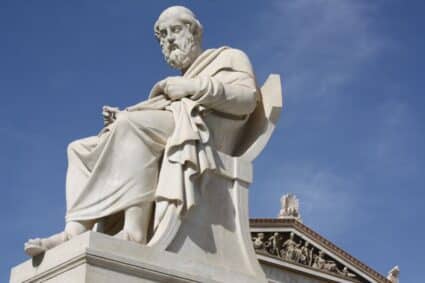Last updated on August 2, 2023 by Roger Kaufman
40 Plato Quotationsthat make you think – Plato’s thinking has fundamentally shaped Western philosophy.
As a student of Socrates and teacher of Aristotle, he left us an extensive work that had a great influence on the development of human knowledge.
In his teaching he founded the first principles of ethics, politics, metaphysics and aesthetics, which are still of crucial importance today.
Plato, the master of dialogue, left us a wealth of inspiring quotes that provide profound insights into the human condition Nature and provide the structure of our society.
They are a shining example of his unsurpassed wisdom and his ability to distill deep philosophical concepts into accessible form.
In the following collection I present to you 40 exquisite ones Quotes from Plato.
Each Quote offers a unique perspective and encourages reflection on the big questions of life.
Let yourself go wisdom Plato's inspiration and challenge to see the world with new eyes.
Plato Quotes: Insights into 40 selected quotes | Wisdom
“The first and greatest victory is to defeat yourself.” – Plato
“Knowledge that is not understood is useless.” – Plato
“A good decision is based on knowledge and not on numbers.” – Plato
Courage is knowledge of what is not to be feared.” – Plato
“He who is righteous needs no praise.” – Plato

“The empty pot makes the most noise.” – Plato
“The fate of democracy is to eventually descend into tyranny.” – Plato
“When knowledge and serenity unite, emerges Wisdom." – Plato
“There is no harm to those who do good.” – Plato
“Necessity is the mother of invention.” – Plato

"The Man – a being in search of meaning.” – Plato
“Philosophers must be kings or kings must philosophize.” – Plato
“The beginning is the most important part of the work.” – Plato
“Ignorance, the true root and source of all evil.” – Plato
“Justice means fulfilling one’s obligations and not harming others.” – Plato

“He gives music soul a cosmic order.” – Plato
“Caution is the surest wealth.” – Plato
“The sky is high, the king is wide.” – Plato
“Self-knowledge is always preferred over self-expression.” – Plato
“The needs of the soul are more important than the needs of the body.” – Plato
The most beautiful love quotes “Symposium” by Plato

Plato made several notable statements in his dialogues of Love made, especially in “The Symposium”. Here are some of them:
“Every act of of Love and kindness elevates the soul to immortality.” – Plato
"At the Touch of love everyone becomes a poet.” – Plato
“Love is that , to always possess the good.” – Plato
of Love is a serious mental illness.” – Plato
“When love is unrequited, be brave enough to accept your love To open your heart again.” – Plato

“Love is the joy of the good, the wonder of the wise, the astonishment of the unbelieving.” – Plato
The unexplored live is not worth living.” – Plato
“In silence one finds the peace necessary to see all things clearly.” – Plato
“It is better to be a changed man than a successful man.” – Plato
“All men are destined to become philosophers.” – Plato
“The good conversation is the good life.” – Plato

“Love is a serious mental illness.” – Plato
“The greatest punishment for refusing to lead is being under the command of someone less qualified.” – Plato
“The teacher must love more than he teaches.” – Plato
“Lack of activity destroys the good condition of every human being.” – Plato
“Wisdom is Truth well pursued.” – Plato

“Insight is the medicine of the soul.” – Plato
“Passion should be the servant of reason.” – Plato
“Reality is for those who to be able to see beyond appearances.” – Plato
“We can easily forgive one Kind, who is afraid of the dark. The real tragedy of life is when men are afraid of the light.” – Plato
“Justice in the hearts of men gives permanence to a nation.” – Plato
Plato's view on ethics
Plato's ethics is a central part of his philosophy and has had a significant influence on the development of Western ethical and moral theories.
Here are some of his main views on ethics:
- Virtue is knowledge: One of the central theses of Platonic ethics is that virtue is ultimately based on knowledge. Plato believed that no one intentionally does evil. When people commit wrongdoing, it is because they are ignorant or misguided. If they really knew what was good, they would act accordingly.
- The idea of good: For Plato, the good is the highest form or idea, and all other forms strive towards it. Good is the ultimate goal of all human actions and endeavors.
- Justice: In his work “The Republic”, Plato defines justice as the order and harmony of the soul, which is achieved when all parts of the soul - reason, spirit and desire - carry out their respective functions properly. On a social level, justice means that each class of people - rulers, guardians, producers - fulfills their tasks without interfering with the tasks of others.
- The role of reason: Plato believed that reason is the highest element of the human soul and it is the one in control about the others Parts of the soul should have - mind and desire. Through the proper application of reason, man can recognize what is good and act accordingly.
- eudaimonia: eudaimonia, often referred to as “happiness” or “the good life” translated, is the ultimate goal of human actions in Platonic ethics. Eudaimonia is achieved when the human soul acts in accordance with reason and virtues.
These views on ethics are set out in many of his dialogues, particularly in “The Republic”, “Gorgias”, “Phaidon” and “Meno”.
FAQ about Plato:
Who was Plato?

Plato was an ancient Greek philosopher who lived around 428/427 BC. was born around 348/347 BC. Died. He was a student of Socrates and the teacher of Aristotle, and his works formed the basis for all Western philosophy.
What are some of Plato's most famous works?

Some of Plato's most famous works are “The Republic,” in which he sets out his ideas about justice and the ideal society, “The Symposium,” which deals with the nature of love, and “Phaidon,” which deals with the death of his teacher Socrates .
What is Plato's theory of ideas?

Plato's theory of ideas, also known as the theory of forms, is the view that the material world is not the true reality, but only a reflection of the true reality, which consists of the eternal and unchanging ideas or forms.
What were Plato's views on ethics?

Plato believed that virtue is knowledge and no one intentionally does wrong. He argued that ignorance is the reason for immoral actions and knowledge and understanding lead to right action.
How did Plato influence politics?

In “The Republic,” Plato introduced the idea of the ideal society in which citizens are divided into three classes: the rulers, the guardians and the producers. He believed that rulers should be philosophers since only they possess the knowledge and wisdom to guide and protect the common good.
What is Plato's Academy?

The Academy was a school founded by Plato in Athens. It was one of the first institutions of higher learning in the Western sense. The academy attracted students interested in Plato's teachings, including his most famous student, Aristotle.
What was Plato's view of art?

Plato had an ambivalent attitude towards art. He admired their power to evoke emotions and influence people, but at the same time was skeptical of their ability to present the truth. In his ideal society, artists would be strictly controlled to ensure that their works were morally and ideologically sound.
What was Plato's opinion on love?

In “The Symposium,” Plato describes various aspects of love, including romantic love, Platonic love, and the love of beauty and wisdom. He presents the idea that the highest form of love is love for the “form of the beautiful,” an eternal and unchanging concept of beauty.
Is there anything else I need to know about Plato?
Plato's philosophical ideas are very wide-ranging and complex, but here are some more important pointsWhat you should know about Plato:
- Allegory of the cave: This is one of Plato's most famous thought experiments and one of the most famous allegories in philosophy at all. In the Allegory of the Cave, presented in “The Republic,” Plato describes how the most People live in a “cave” of ignorance and illusion and true reality can only be known through philosophy and enlightenment.
- Education: Plato was one of the first philosophers to emphasize the importance of education. He believed that a good education is essential to develop virtue and wisdom and create a just society.
- dualism: Plato was a dualist, that is, he believed that reality is divided into two fundamental levels: the sensible world, which is subject to constant change, and the world of ideas or forms, which is eternal and unchanging. This dualism is a central aspect of his philosophy.
- Plato and Socrates: It is important to note that many of the dialogues that Plato wrote have his teacher Socrates as the main character. Therefore, it is sometimes difficult to distinguish which ideas should be attributed specifically to Socrates and which specifically to Plato.
- influence: Plato's thoughts and ideas have had an enormous influence on Western philosophy and culture. His works were studied and discussed extensively by many subsequent philosophers, including Aristotle, Augustine, Thomas Aquinas, René Descartes and many others.








